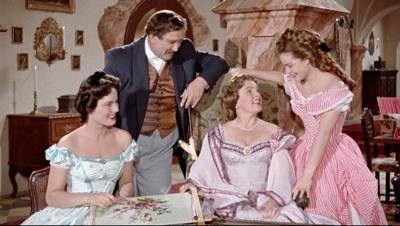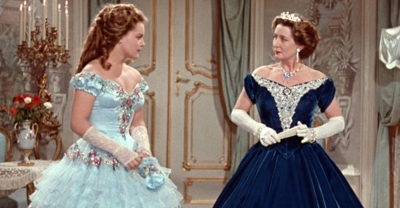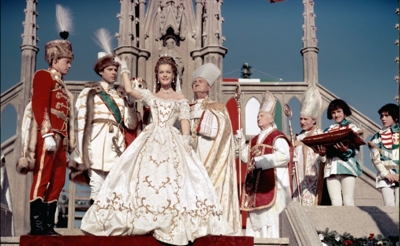 Grade: B/B+
Grade: B/B+
1955-57, 318 min. (3 films), Color
Drama, romance, biopic
Film Movement
Not rated (would be G)
Aspect ratio: 1.78:1 widescreen or 1.33:1
Featured audio: DTS 2.0 Mono
Bonus features: B+
Includes: 4 Blu-ray discs and 1 DVD
Amazon link
Biopics were big in the ’40s and ‘50s. Whether it was Gary Cooper as Lou Gehrig, Greer Garson as Marie Curie, James Cagney as George M. Cohen, James Stewart as Charles Lindberg, Danny Kaye as Hans Christian Andersen, or any number of others, audiences enjoyed watching their Hollywood heroes playing real-life ones.
In Europe, though, one biopic towered regally over all the rest: the phenomenally popular Sissi trilogy from director Ernst Marischka, starring Romy Schneider. In Sissi (1955), Sissi: The Young Empress (1956), and Sissi: The Fateful Years of an Empress (1957), Schneider played Princess Elisabeth of Bavaria, who went on to marry Franz Josef, Emperor of Austria. As the  Empress, “Sissi” reigned alongside him from 1854-1898, and significantly helped unite Austria and Hungary.
Empress, “Sissi” reigned alongside him from 1854-1898, and significantly helped unite Austria and Hungary.
By today’s standards, all of the postwar biopics seem sanitized and romanticized, and Sissi is no exception. The “fateful years” don’t involve a guillotine or even a significant loss of any kind, because movies from this era either stopped short of showing a historical figure’s real tragic fate or softened it by depicting it off-camera. The real Empress Elisabeth was assassinated at age 60, but this cheery blend of history, comedy, and romance only covers Sissi’s late teenage years growing up in Bavaria through her forties as Empress trying to balance the demands of government with her own needs and desires. Even that last phrase, as I write it, seems more sensational than this film or biopics from the era, which were intended as entertainments for the whole family.
The Sissi Collection is presented in widescreen color in German, with English subtitles. That, of course, will limit who in the family can watch (or enjoy) the films. For those who can’t tolerate subtitles, a bonus DVD includes the English dubbed version of the first film, Sissi. While it doesn’t have the  sharpness and color pop of the Blu-rays, it might be the way to go for some families, as, schmaltzy as they are, these films do hold some appeal, still.
sharpness and color pop of the Blu-rays, it might be the way to go for some families, as, schmaltzy as they are, these films do hold some appeal, still.
Sissi has the scenery and alpine wholesomeness of Heidi, the familial comedy of the original Cheaper by the Dozen, the marry-‘em-off complications of Pride and Prejudice, and the aristocratic pageantry of fifties’ period films like War and Peace. Though the Sissi trilogy is more than 60 years old, it still holds up pretty well because of such elements. It’s a lavishly produced film that seems to have spared no expense. There’s an incredible amount of detail in every background in every frame, and a trailer for the second film promised audiences even more grandeur than they saw in the wedding scene that ended the first installment.
Sissi was the film that made Viennese actress Romy Schneider an international star, and there’s indeed something about Sissi and the way Schneider inhabits the character. She exudes a charm that makes you believe all men could fall in love with her or willfully bend to her wishes, yet there’s also an innocence and naive optimism here that supports her “country girl” upbringing in Bavaria, far from the sophistication of big-city courtly life. In a way, her story is a real-life variation on the Aesop fable of the country mouse who visits his cousin in the big city.
 The Bavarian princess is fond of horseback riding, fishing, hiking, and accompanying her father—the robust and unabashedly uncouth Duke Max (Gustav Knuth)—on his hunting excursions. The family enjoys life and all its simple pleasures, whether it’s sharing a big pot of sausage or laughing at the father’s latest affronts to aristocratic conventions. At the family castle in Bavaria, Sissi has a pet fawn and pet birds and herself seems so full of life that you know exactly what’s going to happen when her mother, Duchess Ludovika of Bavaria (Magda Schneider), takes her two daughters to Austria to meet Emperor Franz Josef, the son of her sister Sophie (Vilma Degischer) that the two have secretly plotted to marry off to Sissi’s older sister, Nene (Uta Franz).
The Bavarian princess is fond of horseback riding, fishing, hiking, and accompanying her father—the robust and unabashedly uncouth Duke Max (Gustav Knuth)—on his hunting excursions. The family enjoys life and all its simple pleasures, whether it’s sharing a big pot of sausage or laughing at the father’s latest affronts to aristocratic conventions. At the family castle in Bavaria, Sissi has a pet fawn and pet birds and herself seems so full of life that you know exactly what’s going to happen when her mother, Duchess Ludovika of Bavaria (Magda Schneider), takes her two daughters to Austria to meet Emperor Franz Josef, the son of her sister Sophie (Vilma Degischer) that the two have secretly plotted to marry off to Sissi’s older sister, Nene (Uta Franz).
The obligatory romantic-comedy “meet cute” is well suited to this story, and while the acting is more than competent it’s director Marischka’s attention to detail that captivates almost as much as Sissi. Whether it’s seeing the toys that children played with in an 1800’s nursery, watching lavish ballroom dances and public performances, or experiencing a common marketplace, viewers are given a wonderful glimpse into a window of life as it was lived in a bygone era. Added to Schneider’s captivating performance and comic relief provided by Duke Max and an overzealous military attaché named Böckl (Josef Meinrad), and it makes all three Sissi films (though especially the first) enjoyable, light entertainment.
Will it be enough to hold the interest of the youngest family members? That will depend on the children and how many older movies you’ve watched with them. Though we watch Sissi grow up, there’s something forever childlike about her, even as an adult, and there are plenty of children scattered  throughout the pictures to appeal to younger viewers. In the second film we see Sissi’s strained relationship with her mother-in-law come to a head, and she runs away to Hungary with her child and spends time with Hungarian royalty—an episode that brings not only Franz and Sissi closer together, but also Austria and Hungary. In the third film, Sissi fights off a serious illness and her family has to deal with the fact that her brother wants to marry an American actress (gasp!).
throughout the pictures to appeal to younger viewers. In the second film we see Sissi’s strained relationship with her mother-in-law come to a head, and she runs away to Hungary with her child and spends time with Hungarian royalty—an episode that brings not only Franz and Sissi closer together, but also Austria and Hungary. In the third film, Sissi fights off a serious illness and her family has to deal with the fact that her brother wants to marry an American actress (gasp!).
The Sissi trilogy may not get a lot of repeat play, but because these films are seamless and feel like one long film with a continuous narrative rather than one original and two sequels, they feel like the mini-series of today. I could easily picture families binge-watching the three films. Also included in this five-disc set is an earlier film that Schneider made with Marischka, Victoria in Dover, which doesn’t hold up quite as well as the Sissi films—though it’s interesting to compare it not only to the Sissi trilogy but also more contemporary cinematic attempts to tell the same story, like Victoria & Albert or the TV mini-series Victoria.


Leave a comment